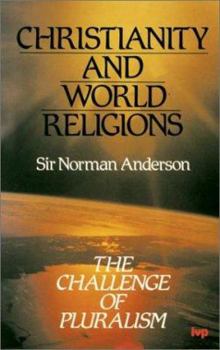Christianity and World Religions
Select Format
Select Condition 
Book Overview
How does the Christian faith relate to other faiths? Do these other faiths have any place in God's plan of salvation? In what sense is Christianity unique? These questions have challenged many thinkers in recent years, including such writers as John Hick and Hans Kung. Norman Anderson examines their writings alongside the biblical evidence and the beliefs of the major non-Christian religions. He probes difficult questions and does not shrink from...
Format:Paperback
Language:English
ISBN:0877849811
ISBN13:9780877849810
Release Date:August 1984
Publisher:IVP Academic
Length:216 Pages
Weight:0.59 lbs.
Dimensions:0.6" x 5.2" x 8.0"
Customer Reviews
2 ratings
The uniqueness of Christianity
Published by Thriftbooks.com User , 23 years ago
This book, along with Dissonant Voices by Harold A. Netland (which I have also reviewed), is among the best Christian books I have read on the relation of Christianity to the world's other major religions.The main thrust of this work is the uniqueness of the Gospel. There are three major chapters dealing with the uniqueness question: A unique proclamation? A unique salvation? A unique disclosure?The two other chapters: No other name? Proclamation, dialogue, or both?"A unique proclamation?" discusses the idea that the New Testament argues that God-in-manhood (i.e. Jesus Christ) has died in human history and has been physically resurrected as well; these are unique historical events. Anderson contrasts this with major differences found in other religions. The mystery religions of the early Christian era (c. 0-200 A.D.) are myth based whereas Christianity is based on events in a specific place and a specific time. Anderson also notes the mythological basis of Hinduism (he also discusses the Hindu doctrine of avatars which is quite DIFFERANT from the Christian doctrine of the Incarnation). As for religions with a historical basis, he discusses Islam and Judaism (and includes Buddhism under this category, but I don't agree. Buddhism could exist if the historical Buddha was mythological.)"A unique salvation?" discusses the ultimate goal or purpose of human existence, as understood from Christianity and other religions. For the Christian, this would be Heaven and the forgiveness of sins etc... However, this stands in sharp contrast to other religions, which have, for example, release from reincarnation as their "salvation." Anderson than classifies religions into two categories; those that are "this worldy" and those that are Hereafter oriented. The "this-worldly" religions/ideologies discussed are: Communism, Fascism, Theravada Buddhism, and Zen Buddhism. Then there are the religions where salvation is "primarily in terms of eternity" (e.g. Hinduism, Bhaki Hinduism, Mahayana Buddhism etc...). He notes that Christianity is among the very few with the dual emphasis both on eternity and the present world. Then, Anderson looks at the question of how salvation is to be attained in various different religions and the differences that are entailed here."A unique disclosure?" contrasts the Christian revelation of the nature and character of God to other religions. Anderson addresses the so-called, "evolutionary theory of religions," which asserts that religions start as animism, then polytheism and lastly monotheism. Anderson presents contrary evidence to this, in that there have been several tribes discovered which are either at the level of monotheism (and this development could not be attributed to outside influences) or henotheism (which is belief in or worship of one God while admitting or not denying the existence of other Gods; i.e. the notion of a "Supreme" God). Anderson looks at the problem of evil, the character of God and some other ideas in the
Good discussion of traditional Christian views vs. pluralism
Published by Thriftbooks.com User , 24 years ago
I thought the book was very good. Anderson's background contributed to that. He is a scholar, having taught Islamic law in England for many years, but he also takes an evangelical approach, which is helpful for Christians with traditional backgrounds. He also refutes many of the better known pluralists (Hicks, Cantwell, etc.), and helps the average person better understand the whole issue. This issue is extremely important to the church. Anderson discusses such questions as: Is Christianity unique? Can one be saved by any other name but Jesus? and so forth. This is a good book to read about this important subject and while meaty it is not too hard for most lay people to read and get something out of it.





